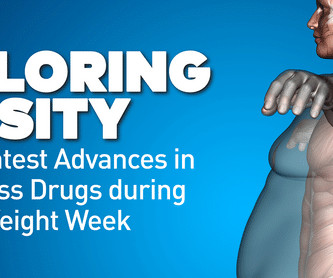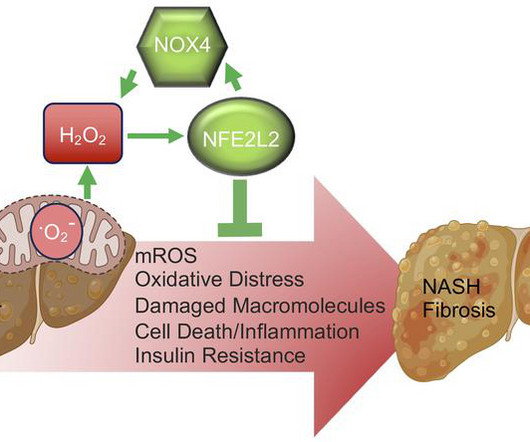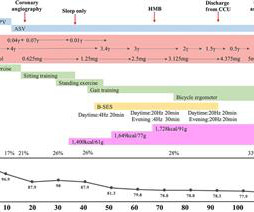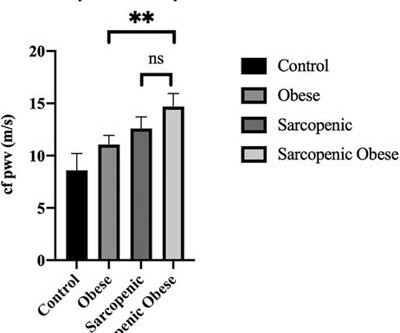Obesity Linked to Worse Patient-Reported Outcomes in Rheumatoid Arthritis
HCPLive
JUNE 29, 2024
Patients with RA and obesity exhibited worse scores for subjective measures like pain and fatigue compared to those without obesity.
This site uses cookies to improve your experience. By viewing our content, you are accepting the use of cookies. To help us insure we adhere to various privacy regulations, please select your country/region of residence. If you do not select a country we will assume you are from the United States. View our privacy policy and terms of use.
 Obesity Related Topics
Obesity Related Topics 
HCPLive
JUNE 29, 2024
Patients with RA and obesity exhibited worse scores for subjective measures like pain and fatigue compared to those without obesity.

Med Page Today
JULY 5, 2024
(MedPage Today) -- GLP-1 receptor agonists lowered the risk of several obesity-associated cancers, a retrospective analysis of electronic health records suggested. Compared with insulin, GLP-1s were associated with a lower risk for developing.

American Heart News - Heart News
MAY 20, 2024
Statement Highlights: More than 40% of adults in the United States live with obesity, and the percentage of people living with obesity continues to increase dramatically. While experts have learned a great deal about the causes of obesity and.

Medical Xpress - Cardiology
JULY 9, 2024
Researchers from King's have identified evidence to suggest that lifestyle changes could offset the risk of some adult heart disorders that result from maternal obesity and changes in fetal heart development.

Med Page Today
MARCH 27, 2024
(MedPage Today) -- The daily step count needed to reduce the risk of obesity may be largely dependent on genetics, a retrospective cohort study indicated. adults without obesity in the All of Us Research Program, incidence of obesity.

HCPLive
APRIL 19, 2024
This interview segment featured a discussion on Jay’s ACP Internal Medicine Meeting presentation ‘Advancing Equitable Approaches to Improve Obesity Care.’

HCPLive
JANUARY 25, 2024
After adjusting for confounders, data revealed higher levels of obesity indices were linked with a gradual and dose-dependent increase in urate levels.

HCPLive
JUNE 23, 2024
In the special on-site ADA 2024 episode, hosts are joined by the ADA's Chief Scientific and Medical Officer Robert Gabbay, MD, PhD, to discuss the newly formed Obesity Association.

American College of Cardiology
JULY 16, 2024
For patients with obesity-related heart failure with preserved ejection fraction (HFpEF), what is the effect of semaglutide on change in New York Heart Association (NYHA) functional class over time?

HCPLive
JUNE 21, 2024
In retrospective, observational research at ADA 2024, real-world weight loss was linked to a reduction in the risk of obesity-related cancers.

American College of Cardiology
JULY 24, 2024
The following are key points to remember from a review of medications used to treat obesity.

Cardiometabolic Health Congress
JANUARY 3, 2024
In today’s society, the prevalence of obesity has become a significant concern. have obesity, and this rate has increased by more than 10 percentage points in the past two decades. Understanding the prevalence of obesity is crucial in comprehending why events like Healthy Weight Week are essential. of adults in the U.S.

Med Page Today
APRIL 18, 2024
(MedPage Today) -- Tirzepatide (Zepbound) injections reduced sleep apnea severity among patients with obesity, regardless of positive airway pressure (PAP) use, according to topline data from two phase III trials. In the SURMOUNT-OSA 1 study.

Med Page Today
JUNE 24, 2024
(MedPage Today) -- Metabolic surgery became the first therapy associated with a reduction in incident cardiovascular disease and death among patients with obesity and obstructive sleep apnea (OSA), based on a retrospective cohort study. Such patients.

HCPLive
FEBRUARY 2, 2024
Obesity was linked to an increased risk of focal segmental glomerulosclerosis and hypertensive nephropathy, with further analysis revealing its impact on the risk of developing end-stage kidney disease.

HCPLive
JUNE 21, 2024
Atul Malhotra, MD, discusses the results of the SURMOUNT-OSA trial and how they inform clinicians on the role of tirzepatide in OSA and obesity.

HCPLive
FEBRUARY 5, 2024
Tirzepatide, a dual GLP-1/GIP agonist approved for diabetes and obesity, was associated with significant blood pressure reductions in an analysis of the SURMOUNT-1 trial.

Circulation
MAY 20, 2024
Obesity is a recognized public health epidemic with a prevalence that continues to increase dramatically in nearly all populations, impeding progress in reducing incidence rates of cardiovascular disease. Circulation, Ahead of Print.

HCPLive
FEBRUARY 14, 2024
Patients with ACPA-positive RA and obesity had greater DAS44 scores compared to normal-weight patients, although this difference was not present in ACPA-negative RA.

Journal of Clinical Investigation - Cardiology
FEBRUARY 1, 2024
Nonalcoholic fatty liver disease (NAFLD) is prevalent in the majority of individuals with obesity, but in a subset of these individuals, it progresses to nonalcoholic steatohepatitis (0NASH) and fibrosis. The mechanisms that prevent NASH and fibrosis in the majority of patients with NAFLD remain unclear.

American Heart News - Heart News
FEBRUARY 5, 2024
Research Highlights: The weight loss medication tirzepatide significantly lowered the systolic blood pressure of nearly 500 adults who had obesity and took the medication for 36 weeks, or about eight months, in a subset of an international clinical.

American Heart News - Heart News
JANUARY 17, 2024
Research Highlights: Consistently high scores of perceived stress during adolescence through adulthood may contribute to worse cardiometabolic health including obesity in young adults. Researchers suggest the adoption of healthy coping strategies.

Science Daily - Heart Disease
JANUARY 17, 2024
Young adults who reported higher stress as adolescents were more likely to have high blood pressure, obesity and other cardiometabolic risk factors as adults, finds new study.

Medical Xpress - Cardiology
JANUARY 16, 2024
Obesity-induced heart disease, which affects up to 10% of the population in certain age ranges, is considered an untreatable condition and 75% of people don't survive more than five years beyond diagnosis.

Medical Xpress - Cardiology
JULY 9, 2024
Semaglutide reduces cardiovascular events, regardless of baseline glycated hemoglobin (HbA1c), among people with overweight or obesity and established atherosclerotic cardiovascular disease, according to a study published online June 22 in Diabetes Care.

Cardiovascular Diabetology
APRIL 1, 2024
Obesity is often associated with multiple comorbidities. However, whether obese subjects with hyperlipidemia in the absence of other complications have worse cardiac indices than metabolically healthy obese su.

HCPLive
JULY 11, 2024
mg (Wegovy) confers benefit across the spectrum of NYHA functional class among patients with obesity-related HFpEF. A STEP-HFpEF analysis suggests semaglutide 2.4

American College of Cardiology
JUNE 4, 2024
The goal of the Dual vs. Single DCCV trial was to determine the efficacy and safety of dual direct-current cardioversion (DCCV) compared with single DCCV in patients with obesity and atrial fibrillation (AF) undergoing elective electrical cardioversion.

American College of Cardiology
JUNE 24, 2024
The goal of the SURMOUNT-OSA trial was to determine the effect of tirzepatide, both alone and in the setting of positive airway pressure (PAP) therapy, on obstructive sleep apnea (OSA) burden in patients with obesity.

CardiacWire
DECEMBER 6, 2023
The already massive GLP-1 obesity drug segment might have gained a major future competitor last week, following Roche’s acquisition of weight loss biotech Carmot Therapeutics. The biotech also has a once-daily dual GLP-1/GIP injectable (yes, daily) that’s in Phase 2 trials and would treat obese or overweight patients with type 1 diabetes.

HCPLive
MAY 19, 2024
Peterson reviews the gastric and hormonal events linked to drugs like tirzepatide, before considering whether incretin therapies will help to finally embrace obesity as the medical condition it is.

American College of Cardiology
APRIL 10, 2024
What are the effects of semaglutide across a broad range of outcomes in people with obesity-related heart failure with preserved ejection fraction (HFpEF) with and without diabetes, and consistency across key patient subgroups?

American College of Cardiology
MAY 29, 2024
The following are key points to remember from an American Heart Association scientific statement on the implementation of obesity science into clinical practice.

HCPLive
APRIL 28, 2024
This observational cohort study looked at the link between obesity and eczema, highlighting regional differences in the skin disease and obesity’s interdependence.

HCPLive
APRIL 20, 2024
During this segment of her interview at the ACP Internal Medicine Meeting, Jay discussed improving obesity care, telehealth utilization for patients, and more.

Frontiers in Cardiovascular Medicine
MARCH 7, 2024
We initiated a mobilization program, but the patient's mobility was highly limited due to severe obesity and symptomatic orthostatic hypotension. B-SES could be an option for patients with heart failure who have limited mobility and obesity. B-SES was introduced to accomplish weight loss and early ambulation.

Medical Xpress - Cardiology
JANUARY 17, 2024
Young adults who reported higher stress during their teenage years to adulthood were more likely to have high blood pressure, obesity and other cardiometabolic risk factors than their peers who reported less stress, according to new research published in the Journal of the American Heart Association.

Med Page Today
MARCH 8, 2024
(MedPage Today) -- Millions of Americans who have dropped pounds and boosted their health using popular obesity drugs like semaglutide (Wegovy) are facing a new dilemma: What happens if they stop taking them? Many worry, rightly, that they'll.

Frontiers in Cardiovascular Medicine
FEBRUARY 7, 2024
Background Aging is associated with a higher prevalence of sarcopenia, sarcopenic obesity (SO), and increased arterial stiffening, with possible detrimental effects on morbidity and mortality. The population was sorted into four subgroups: obese, sarcopenic, SO, and controls. SO had the highest value of cfPWV (15.18 ± 8.44 m/s),

American College of Cardiology
JUNE 24, 2024
Semaglutide reduces body weight to a greater extent in women with obesity-related heart failure with preserved ejection fraction (HFpEF) than in men, and improved Kansas City Cardiomyopathy Questionnaire Clinical Summary Score (KCCQ-CSS) to the same extent in both women and men, according to results from a prespecified secondary analysis of pooled (..)

American College of Cardiology
MARCH 6, 2024
Bariatric surgery is effective in controlling hypertension (HTN) and polypharmacy in patients with obesity, according to results from the GATEWAY clinical trial published Feb. 5 in JACC.

Journal of Clinical Investigation - Cardiology
FEBRUARY 15, 2024
Melanocortin 4 receptor (MC4R) mutations are the most common cause of human monogenic obesity and are associated with hyperphagia and increased linear growth. While MC4R is known to activate Gsα/cAMP signaling, a substantial proportion of obesity-associated MC4R mutations do not affect MC4R/Gsα signaling.

American College of Cardiology
MARCH 12, 2024
What are the trends in the estimated prevalence of underweight and obesity from 1990 to 2022 among adults and children across 200 countries and territories?

Cardiovascular Diabetology
JUNE 5, 2024
Cardiovascular disease (CVD) is closely associated with the triglyceride glucose (TyG) index and its related indicators, particularly its combination with obesity indices. However, there is limited research on.
Expert insights. Personalized for you.
We have resent the email to
Are you sure you want to cancel your subscriptions?

Let's personalize your content